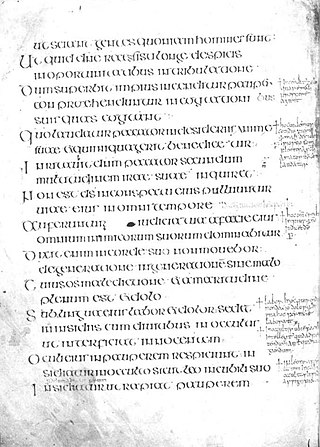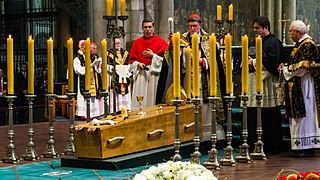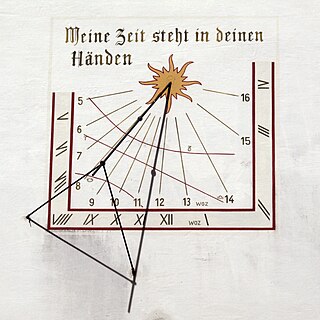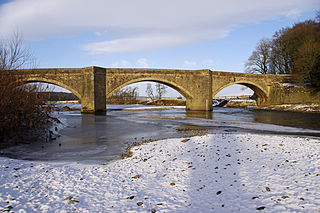Related Research Articles
The Hittites, also spelled Hethites, were a group of people mentioned in the Hebrew Bible. Under the names בני-חת and חתי they are described several times as living in or near Canaan between the time of Abraham and the time of Ezra after the return of the Jews from the Babylonian exile. Their ancestor was Heth.
Papyrus Anastasi I is an ancient Egyptian papyrus containing a satirical text used for the training of scribes during the Ramesside Period. One scribe, an army scribe, Hori, writes to his fellow scribe, Amenemope, in such a way as to ridicule the irresponsible and second-rate nature of Amenemope's work. The papyrus was originally purchased from Giovanni Anastasi in 1839.
Madre Mia is a poem by William Hope Hodgson. It is presented as the dedication to his novel The Boats of the "Glen Carrig".

Psalm 9 is the ninth psalm of the Book of Psalms, beginning in English in the King James Version: "I will praise thee, O LORD, with my whole heart; I will shew forth all thy marvellous works." In Latin, it is known as "Confitebor tibi, Domine". The topic of the psalm is that the success of evil is only temporary, and in the end, the righteous will endure. Psalm 10 is considered part of Psalm 9 in the Greek Septuagint and in most pre-Reformation Christian Bibles. These two consecutive psalms have the form of a single acrostic Hebrew poem.

Psalm 74 is the 74th psalm of the Book of Psalms, beginning in English in the King James Version: "O God, why hast thou cast us off for ever?". In the slightly different numbering system used in the Greek Septuagint and Latin Vulgate translations of the Bible, this psalm is Psalm 73. In Latin, it is known as "Ut quid Deus reppulisti in finem iratus". Subheaded a maschil or contemplation, and a community lament, it expresses the pleas of the Jewish community in the Babylonian captivity. It is attributed to Asaph.

Psalm 30 is the 30th psalm of the Book of Psalms, beginning in English in the King James Version: "I will extol thee, O LORD; for thou hast lifted me up". The Book of Psalms is part of the third section of the Hebrew Bible, and a book of the Christian Old Testament. In the slightly different numbering system used in the Greek Septuagint version of the Bible and in the Latin Vulgate, this psalm is Psalm 29. In Latin, it is known as "Exaltabo te Domine". It is a psalm of thanksgiving, traditionally ascribed to David upon the building of his own royal palace.

The alma mater of the University of Pittsburgh was adopted soon after the University changed its name in 1908 from the Western University of Pennsylvania to its current moniker. Lyrics were written by George M. P. Baird, class of 1909 and were set to the tune of what was then the Austrian National Anthem. A new tune for the "Alma Mater" hymn was composed by Charles W. Scovel, class of 1883, but it was not widely adopted and was either lost or became obscure.
Coronation Ode, Op. 44 is a work composed by Edward Elgar for soprano, alto, tenor and bass soloists, chorus and orchestra, with words by A. C. Benson.

Absolution of the dead is a prayer for or a declaration of absolution of a dead person's sins that takes place at the person's religious funeral.

"To Lord Stanhope" is a poem written by Samuel Taylor Coleridge. It was published in his 1796 collection of poems. The subject, Charles Stanhope, 3rd Earl Stanhope, had originally shared political views with Coleridge, but as time passed, Coleridge's views gradually shifted. By 1803, Coleridge was claiming that he did not want the poem published anymore and that it was originally intended to mock those who held the beliefs which Coleridge had held years earlier. It is part of the Sonnets on Eminent Characters series, although it was not published in the Morning Chronicle unlike the others in the series. There is, however, a possible predecessor sonnet to the 1796 version that some editors have attributed to Coleridge.

Psalm 31 is the 31st psalm of the Book of Psalms, beginning in English in the King James Version: "In thee, O LORD, do I put my trust". In Latin, it is known as "In te Domine speravi". The Book of Psalms is part of the third section of the Hebrew Bible, and a book of the Christian Old Testament. In the slightly different numbering system used in the Greek Septuagint version of the Bible, and in its Latin translation, the Vulgate, this psalm is Psalm 30. The first verse in the Hebrew text indicates that it was composed by David.

Psalm 66 is the 66th psalm of the Book of Psalms, beginning in English in the King James Version: "Make a joyful noise unto God, all ye lands". In the slightly different numbering system of the Greek Septuagint version of the Bible and the Latin Vulgate, this psalm is Psalm 65. In Latin, it is known as "Iubilate Deo omnis terra". It is a psalm of thanksgiving probably intended for use at the Passover. The psalm is divided into two parts: in verses 1-12 the community praises God and invites the whole world to join in praise; in verses 13–20, "an individual from the rescued community fulfils a vow to offer a sacrifice of thanksgiving".

Psalm 71 is the 71st psalm of the Book of Psalms, beginning in English in the King James Version: "In thee, O LORD, do I put my trust: let me never be put to confusion". It has no title in the Hebrew version. In the slightly different numbering system used in the Greek Septuagint and Latin Vulgate translations of the Bible, this psalm is Psalm 70. In Latin, it is known as "In te Domine speravi".

Psalm 77 is the 77th psalm of the Book of Psalms, beginning in English in the King James Version: "I cried unto God with my voice, even unto God with my voice; and he gave ear unto me". In the slightly different numbering system used in the Greek Septuagint and Latin Vulgate translations of the Bible, this psalm is Psalm 76. In Latin, it is known as "Voce mea ad Dominum clamavi".
Kumayl bin Ziyad an-Nakha'i was among the most loyal companions of Imam Ali Ibn Abi Talib. Moreover, Kumayl occupies a prominent position in Shia Islam. Converting to Islam during the time of Islamic prophet Muhammad, he rose to a position of prominence during the caliphates of Uthman and Ali. In the caliphate of Ali, Kumayl flourished and served him in the most disciplined of ways. However, he is recognized for his pious and humble nature as well as preserving Imam Ali's teachings. Kumayl is best known for the du'a (supplication) of Prophet Khidr, which is commonly known by the name du'a Kumayl.

Skerton Bridge is a road bridge carrying the southbound lanes of the A6 road over the River Lune in Lancaster, Lancashire, England. The bridge is recorded in the National Heritage List for England as a designated Grade II* listed building and Scheduled Monument.

Loyn Bridge crosses the River Lune, carrying a minor road between the villages of Hornby and Gressingham in Lancashire, England. The present bridge replaces an older bridge, which is thought to have been constructed with timber decking between stone piers. There is evidence that the river was forded here before a bridge was built. The date of the building of the present bridge is unknown; it is considered to have been after 1591, when the previous bridge was described as being "in a dangerous condition". A date of 1684 has been suggested, but petitions regarding the bridge put before the Quarter Sessions between 1650 and 1750 make no mention of a new bridge between these dates. The bridge was paid for by the County of Lancashire, and later the responsibility for maintenance and repairs was transferred to the Lonsdale Hundred.
"Crown Him with Many Crowns" is an 1851 hymn with lyrics written by Matthew Bridges and Godfrey Thring and sung to the tune 'Diademata' by Sir George Job Elvey. The hymn appears in many hymnals.
"The Ballad of Cassandra Southwick" is a poem written by American Quaker poet John Greenleaf Whittier in 1843. It details the religious persecution of Cassandra Southwick's youngest daughter Provided Southwick, a Quaker woman who lived in Salem, Massachusetts and is the only white female known to be put up at auction as a slave in the United States.

The Begatting of the President is a satirical album narrated by Orson Welles, summarising the presidency of Lyndon B. Johnson and the election of 1968, leading up to the election of Richard Nixon, delivered in the style of Biblical verse.
